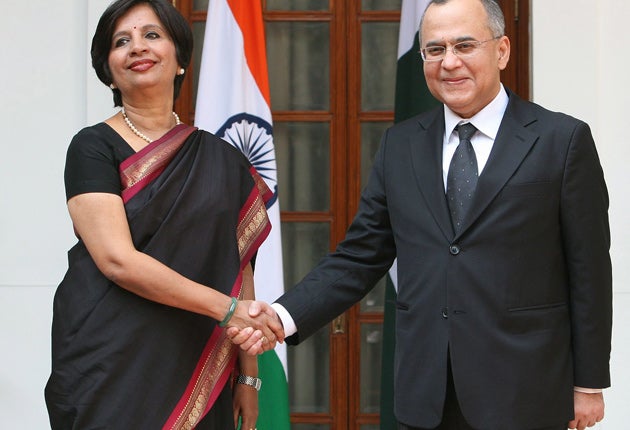Pakistan and India start talking again after Mumbai attack
Frosty meeting leaves major sticking points but rivals will 'keep in touch'

Your support helps us to tell the story
From reproductive rights to climate change to Big Tech, The Independent is on the ground when the story is developing. Whether it's investigating the financials of Elon Musk's pro-Trump PAC or producing our latest documentary, 'The A Word', which shines a light on the American women fighting for reproductive rights, we know how important it is to parse out the facts from the messaging.
At such a critical moment in US history, we need reporters on the ground. Your donation allows us to keep sending journalists to speak to both sides of the story.
The Independent is trusted by Americans across the entire political spectrum. And unlike many other quality news outlets, we choose not to lock Americans out of our reporting and analysis with paywalls. We believe quality journalism should be available to everyone, paid for by those who can afford it.
Your support makes all the difference.Fifteen months after peace talks between India and Pakistan were abruptly halted in the aftermath of the Mumbai attacks, the two South Asian neighbours retook their position across the negotiating table yesterday.
During a four-hour meeting hosted in Delhi, which was widely seen as more important for the fact that it simply took place rather than for what was achieved, each side raised with the other its "core issues" – subjects which have barely changed in years. For India, the priority was to push Pakistan to do more to counter militants, particularly those behind the attacks in Mumbai, while topping Pakistan's agenda was the demand to find a solution to the long-burning issue of Kashmir.
Whether any genuine progress was made in bridging the differences of the two nuclear-armed neighbours, who have gone to war on three occasions, may not become clear for some days yet. While no date has been set for more talks, both sides said they would "keep in touch".
But it appeared clear that there had been no breakthrough on anything that might have been considered substantive. Going into the talks both sides had played down their expectations and after the meeting at Hyderabad House, a former royal palace, was concluded, neither side suggested that their initial assessment had been wrong.
"We went into today's talks with an open mind but fully conscious of the limitations imposed by the large trust deficit between the two countries," said India's foreign secretary, Nirupama Rao. "In line with our graduated and step by step approach, our aims were modest." Her counterpart, Salman Bashir, said: "It was a useful exchange. We know all is not well, we know much more needs to be done. We will try to do what we can to make a serious effort to get back from the dirt track we find ourselves on, on to the highway of peace." During the talks, India handed Pakistan what it described as three new dossiers of information regarding the alleged involvement of Hafiz Mohammed Saeed, a former militant leader, in the Mumbai attacks. It called on the Pakistani authorities to take action against Mr Saeed, who recently held a public rally in Lahore at which he threatened to launch a new jihad against India if the Kashmir issue was not resolved.
Pakistani officials pointed out that seven suspects accused of involvement in the attacks that killed 166 people were already being tried in a court at Rawalpindi. Meanwhile, Mr Bashir leveled accusations at India, accusing it of involvement in activities damaging to Pakistan's security. He said there was "credible evidence" that India was supplying weapons to militants and terrorists seeking to undermine Pakistan. "We have ample evidence and we are willing to share this," he said.
Away from the sniping, analysts believe the countries may have been forced back to the negotiating table by the shifting geo-political realities in Afghanistan. Following the Afghanistan Conference in London, when it became clear the West was preparing to deal with at least some elements of the Taliban and that one of the interlocutors could be Pakistan, it appears India did not want to be left out of the larger negotiations.
Flashpoints
* Fought over three times, the long disputed region of Kashmir remains the major stumbling block to better relations between India and Pakistan. Two decades of violence between Indian security forces and Pakistan-backed militants have left more than 70,000 dead.
* India insists that Pakistan is not doing enough to counter Islamic militants, including those who have "infiltrated" Kashmir as well as those behind the 2008 attacks in Mumbai.
* A long-standing treaty over shared water supplies from the Indus River has come into question with Pakistan accusing India of robbing it by building hydro-electric dams upstream.
Join our commenting forum
Join thought-provoking conversations, follow other Independent readers and see their replies
Comments